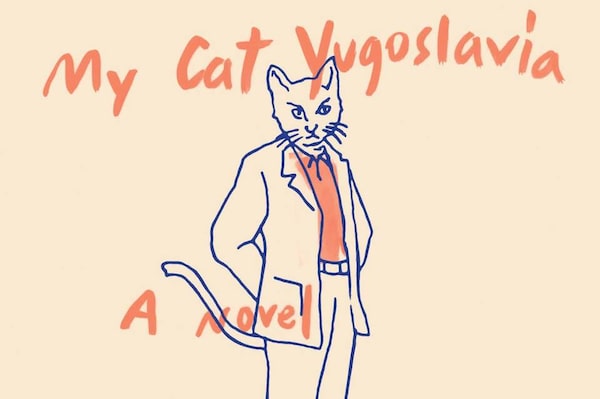
My Cat Yugoslavia
By Pajtim Statovci, translated by David Hackston
Pantheon, 272 pages, $34.95
In Ivo Andric's Bridge on the Drina, the Yugoslav Nobel laureate wrote that in order to see the town and the bridge, "it must be said that there was another bridge in the town and another river." This doubling (another bridge, another river) informs My Cat Yugoslavia, Pajtim Statovci's debut novel of Kosovo. Two snakes. Two narrators: In 1980, a young Kosavar-Albanian girl, Emine, is engaged to the handsome Bajram, but their marriage is no fairy tale. Bajram proves violent just as Yugoslavia breaks apart. Decades later, after the family flees to Finland, their son Bekim is an outcast. Gay, immigrant, Muslim – his parents' dreams have no place for him and Bekim longs to not be asked where he is from. More than two cats: including the anthropomorphic, emotionally abusive feline in the title. The cat is a surrealist break in an otherwise realist novel, and a turning point in Bekim's search for love in Statovci's richly symbolic tale of flight and return, and return, and return again.
Marriage of a Thousand Lies
By S.J. Sindu
Soho Press, 288 pages, $30
Lucky and Kris (Lakshmi and Krishna) are both gay. Theirs is a marriage of convenience, a compromise that allows them a "normal" life in the eyes of family. If emotionally unfulfilling, for years the arrangement has given them safe harbour, allowing both to pursue love on the side. Then comes the news that Lucky's childhood love, Nisha, is engaged in an arranged marriage, throwing Lucky's life in disarray. Although the Sri Lankan civil war does not play large in this novel, its shadow is ever present in S.J. Sindu's portrait of the Boston Sri Lankan Tamil community. Community can be nourishing and what sustains us, but it can also be oppressively insular. For Lucky, even after marriage, community expectation is stifling, expressed through Lucky's mother, herself shunned for her divorce. At the same time, the U.S. lesbian community offers only fleeting respite, a house not a home. A Tamil proverb says a thousand lies can make a wedding. Marriage of a Thousand Lies is the story of one woman tired of lying.
The Inheritance of Shame
By Peter Gajdics
Brown Paper Press, 354 pages, $23.50
This month called Pride, with its imperative to cast off pride's opposite, may seem an odd time to dwell on shame. But shame is a real force in the lives of LGBTQ people and one can be proud and still acknowledge this difficult relationship. In 1989, Peter Gajdics sought help for his distress after his staunchly Catholic family responded poorly to him coming out as gay. Playing off Gajdics's emotional fragility, a psychiatrist in Victoria suggested he could cure the young man of his homosexuality by placing him in a therapeutic group home – an environment that turned out to be a cult, with the psychiatrist at its head. The bulk of Gajdics's memoir charts his horrific six years under this doctor's manipulation, but it's about more than the manufacture and trade in shame. It is also about inheritance – in Gajdics's case, from his parents' experiences around the Second World War – and perseverance. For marginalized people, the words "I'm still here" hold emancipatory power. There's pride in that.